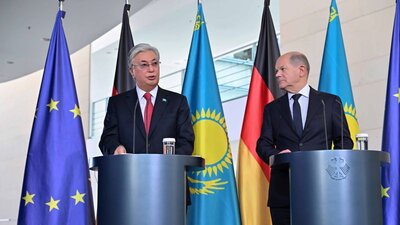16.09.24
Germany aims to improve economic and energy cooperation with Central Asian countries.
German Chancellor Olaf Scholz met today in Astana, the capital of Kazakhstan, with Kazakh President Kassym-Jomart Tokayev as part of his three-day visit to Central Asia. Stating that Germany and Kazakhstan “will make every effort to expand the possibilities of economic relations,” Chancellor Scholz emphasized “strong, thorough and continuous cooperation in the sector of raw materials.”
The refinery in Schwedt, Brandenburg, meets more than 20 percent of its needs with oil imported from Kazakhstan. During Scholz's visit, the plan is to increase the duration and volume of deliveries to 100,000 tons of oil per month by the end of 2024. Kazakhstan is the third largest oil supplier to Germany, with a share of 11.7% after Norway and the US. With a population of about 20 million people, Kazakhstan is the ninth largest oil-exporting country in the world.
Tokayev: Cooperation will be raised to a new level
Kazakh President Tokayev said the visit of German Chancellor Scholz would take relations between the two countries to a “new level” and said: “Our bilateral cooperation is developing in the spirit of strategic partnership.”
In addition to oil, Germany wants to develop cooperation with Kazakhstan in natural gas and hydrogen resources from renewable energy sources, as well as deposits of uranium, zinc, copper, iron ore and gold.
During Scholz's visit, agreements were signed to expand cooperation between the central banks of Kazakhstan and Germany and to establish the Institute of Science and Technology of the Kazakh-German University in Almaty.
Migration agreement signed with Uzbekistan
The most important issue of Scholz's visit to Uzbekistan was the signing of a migration agreement between the two countries. The migration agreement signed between Germany and Uzbekistan provides for facilitating the migration of skilled workers to Germany, especially in the medical and health care sectors, as well as the repatriation of Uzbeks who do not have the right to stay in Germany.
Scholz, who met with Uzbek President Shavkat Mirziyoyev in Samarkand, said after the meeting, “We are creating conditions for the migration to Germany of highly qualified workers who are necessary for the growth of our economy.” On the other hand, Scholz said that bureaucratic procedures for those who return to their country and those who are forced to return will be eased.
Joint meeting with Central Asian leaders
Scholz, who visited Kazakhstan and Uzbekistan with a delegation of businessmen, will hold bilateral meetings with the leaders of Tajikistan, Kyrgyzstan and Turkmenistan in Astana tomorrow, before attending a joint meeting with the leaders of five Central Asian countries.
Scholz met with the leaders of the five Central Asian countries in Berlin last year and the meeting resulted in an agreement on “strategic regional cooperation.”









